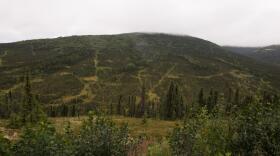The Alaska Department of Natural Resources gave the public 15 days to comment on 12 water right permits for the proposed Donlin Gold mine in December. The Orutsararmiut Native Council claims that wasn’t enough time, especially as villages locked down to slow the spread of the coronavirus, and taking into account limited access to the internet in rural Alaska.
Bethel resident and Orutsararmiut Native Council member Beverly Hoffman has protested the proposed Donlin Gold mine for years, and is frustrated that the Alaska Department of Natural Resources only gave tribes 15 days to comment on a dozen water right permits for the mine. The comment deadline ended December 15, 2020. According to Hoffman, there are a lot of barriers to getting public comment in the Yukon-Kuskokwim Delta.
"Communities are in lockdown; they're not meeting," Hoffman said. "They don't have internet data to hold big Zoom meetings."
Hoffman is also worried that Donlin Gold’s plans for those streams will disrupt people’s way of life in the Y-K Delta. The Donlin Gold mine would be one of the biggest in the world, if completed, and will require a lot of water to treat the mercury and other toxins released during its operations. These 12 water right permits would give Donlin Gold permission to draw down the water of 12 streams for its operations.
The Orutsararmiut Native Council’s letter to DNR echoed Hoffman's concerns.
"First, the Department must not proceed with approving these water rights applications without providing the public the opportunity to review and comment on those applications. Notwithstanding the inadequate information provided, we ask that the Department deny these applications pursuant to Alaska Statute 46.15.080 to 46.15.090 because they are not in the public interest and the existing uses of the waters that would be appropriated by these applications are far more important," the letter said.
Both Hoffman and the letter written by ONC said that the water permits further endanger the region's food security.
"For them to be able to get this water permit that jeopardizes that food security in the manner that it's happening, it's so wrong and dangerous. Dangerous to the people that choose to live a way of life out here," Hoffman said.
The Y-K Delta is one of the most food insecure regions in the country; many of its residents cannot access three meals a day. Roughly 22% to 24% of Y-K Delta households are food insecure, according to Feeding America, a national nonprofit focusing on hunger relief. The organization reports that 21% of households in the Bethel Census Area are food insecure. In the Kusilvak Census Area, which includes villages along the lower Yukon River and Bering Sea coast, those rates are even higher, ranging from 25% to 29%. This makes it the second most food insecure region in the nation, just after Jefferson County, Mississippi. Feeding America reports that one in four Alaska Native households cannot access three meals per day, a rate double that of white households.
Most Y-K Delta residents depend on subsistence foods for the majority of their diet. The Kuskokwim River is the primary food source, and the Donlin Gold mine site would sit near one of its tributaries. The company has emphasized its commitment to building the mine as safely as possible.
A spokesperson for the state, Dan Saddler, said that the process was legal; state statute allows a 15-day comment period. The state can extend that deadline period, but Saddler said that they haven’t gotten a request to do that from any of the tribes or organizations who commented, and that the permits have yet to be approved.
CORRECTION: An earlier version of the article incorrectly said Donlin Gold was granted the 12 water right permits in December. That is incorrect; the public comment for the permits was in December. The article and headline have been updated to include a letter and comment from the Orutsararmiut Native Council that said that DNR did not give adequate time or information for public comment.






